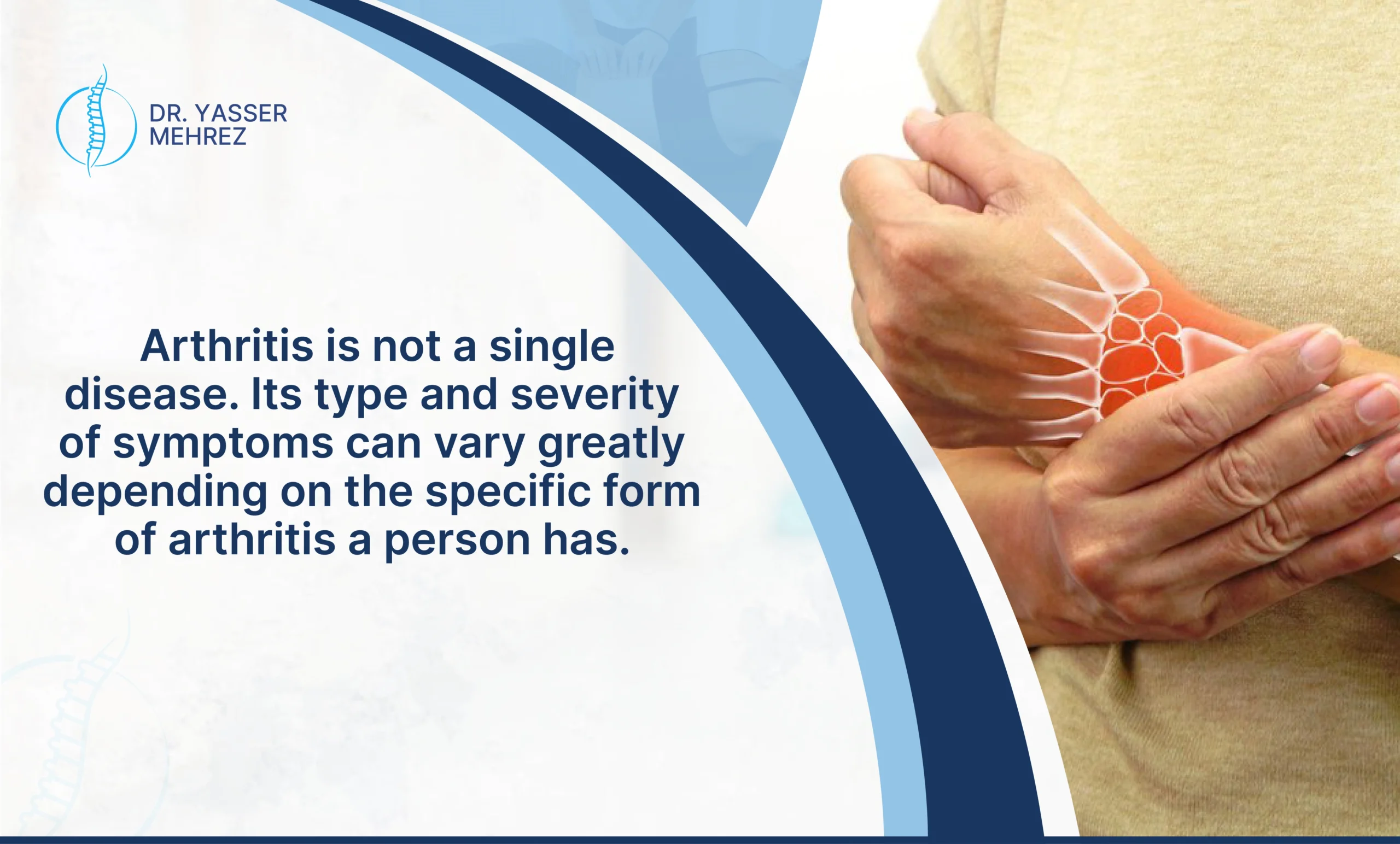Living with arthritis can have a drastic effect on your everyday life. Simple tasks, like getting dressed, climbing stairs, or opening a jar, can suddenly become difficult and painful. Some days may feel manageable, whilst others can leave you feeling exhausted and overwhelmed. The good news is that you don’t have to just “live with it.” Dr. Yasser Mehrez offers non-invasive arthritis pain treatment that can help you minimise the discomfort, improve your mobility, and take back control of your life.
This guide will help you understand your options and find a path toward real, lasting relief.
Table of Contents
Understanding Arthritis: More Than Just Joint Pain
At its core, arthritis is a condition that causes inflammation in the joints. It leads to symptoms like stiffness, pain, swelling, and reduced range of motion. But for many people, it can also affect the skin, muscles, and even overall well-being.
There are over 100 types of arthritis, with osteoarthritis and rheumatoid arthritis being the most common.
You can read more about the different types of arthritis on the Versus Arthritis website.

Osteoarthritis vs. Rheumatoid Arthritis
Osteoarthritis is linked to ageing and wear-and-tear on the joints. Over time, the protective cartilage that cushions your bones wears down. This results in joint pain, cracking, and stiffness, particularly in the knees, hips, hands, and spine. Whilst it progresses gradually, it can become quite debilitating if left unmanaged.
Rheumatoid arthritis, on the other hand, is an autoimmune condition. This is when the immune system mistakenly attacks the body’s own tissues. The target is often the synovium, the soft lining inside the joints. When this lining becomes inflamed, it causes persistent pain, swelling, and morning stiffness that lasts more than 30 minutes. RA can also affect other areas, like the skin, eyes, lungs, and heart.
The Immune System’s Role in Autoimmune Arthritis
In autoimmune forms like rheumatoid arthritis and psoriatic arthritis, your immune system goes into overdrive, mistakenly attacking healthy joint tissues. This leads to ongoing inflammation, thickening of the synovium, and eventually joint damage if not treated early.
Because autoimmune arthritis is systemic, the effects are not limited to the joints. You may feel fatigued, unwell, or notice changes in your skin and eyes. Catching these signs early and getting a clear diagnosis from a rheumatologist can make a real difference in preventing long-term joint deformity and preserving mobility.
Common Symptoms and Diagnosis
Arthritis can affect people in different ways, but there are some common signs to look out for:
- Joint stiffness, especially in the morning or after periods of rest
- Swelling and tenderness in one or more joints
- Pain that worsens with activity and eases with rest
- Warmth or redness around the joints
- Reduced range of motion, making daily tasks more difficult
In addition to these common symptoms, rheumatoid arthritis can affect other parts of the body and is present with a wider range of symptoms. These can include:
- Fatigue: Feeling unusually tired or lacking energy is a common systemic symptom.
- Weakness: Muscle weakness can occur, especially around affected joints.
- Fever: A low-grade fever can be present, particularly during flares of inflammatory arthritis.
- Loss of appetite and unintended weight loss: These can be associated with the systemic inflammation of some types of arthritis.
- Symptoms affecting other organs: Depending on the type of arthritis, people may experience issues with their skin (rashes, nodules), eyes (dryness, redness, inflammation), lungs (shortness of breath, cough), heart, and blood vessels.
- Numbness and tingling: This can occur if nerves are compressed by swollen joints.
- Sleep problems: Pain and discomfort can interfere with sleep.
- Depression and anxiety: Living with chronic pain and reduced mobility can impact mental health.
- Development of bony spurs: These hard lumps can form around affected joints, particularly in osteoarthritis.
- A grating sensation or sound in the joint: This can happen when cartilage has worn away and bone is rubbing on bone.
How Doctors Diagnose Arthritis
Diagnosing arthritis starts with a detailed review of the patient’s medical history. It includes the nature and duration of symptoms, affected joints, any family history of arthritis or autoimmune diseases, and other relevant health information
Then, your doctor starts with a physical examination, checking for tenderness, swelling, and joint movement. Blood tests can help identify markers of inflammation or autoimmune activity, such as on rheumatoid arthritis. Imaging tests like X-rays, MRI scans, or ultrasound can be used to detect joint damage or fluid buildup.
Arthritis Pain Treatment Options
Managing arthritis pain often involves a combination of medication and lifestyle changes.
Over-the-Counter (OTC) Medications:
- Paracetamol for general pain relief
- Ibuprofen (Motrin) and Naproxen for reducing inflammation and swelling
Prescription Medications:
- DMARDs (e.g. Tofacitinib) to slow disease progression in autoimmune arthritis
- Corticosteroids to reduce inflammation and control flare-ups
Topical Treatments:
- Diclofenac gel for targeted pain relief
- Zostrix and other skin-based formulations for localised joint discomfort
With the right combination of therapies, arthritis pain can be managed, allowing you to live with greater comfort and confidence.
When to Consider Advanced Treatments
If standard treatments aren’t giving you the relief you need, it may be time to explore more advanced options. These are recommended when arthritis pain becomes severe or starts to limit your daily life:
Steroid Injections:
- Help reduce inflammation directly in the affected joint
- Offer short-term relief during painful flare-ups
- Often used in combination with other therapies
Surgical Options:
- Joint replacement surgery (commonly for hips or knees) in cases of severe osteoarthritis
- Joint repair or fusion, depending on the joint affected and the degree of damage
- Surgery is typically considered after non-surgical treatments have been exhausted
Dr. Yasser Mehrez also offers fluoroscopic-guided interventions, which use advanced imaging techniques to deliver pain-relieving injections with pinpoint accuracy. These minimally invasive procedures are especially helpful for targeting deep joint or nerve-related pain.
Dr. Yasser Mehrez’s Approach to Arthritis Pain Treatment
When living with arthritis, you deserve a treatment plan that recognises your unique experience. Dr. Yasser Mehrez, a leading Consultant in Pain Medicine, offers just that.
His approach combines:
- Extensive expertise in interventional pain medicine, treating all forms of chronic pain with a focus on arthritis
- Minimally invasive procedures designed to relieve pain with minimal recovery time
- Image-guided interventions, including ultrasound and fluoroscopic-guided injections for pinpoint accuracy
Comprehensive, personalised care:
- Medication strategies balanced for safety and effectiveness
- Practical lifestyle advice to support long-term joint health
- Advanced treatments when needed
Dr. Mehrez is committed to helping you regain comfort and mobility, so you can live and enjoy life more fully.
FAQs
Can weather changes really affect arthritis pain?
Yes, many people with arthritis report that cold, damp, or sudden weather changes can worsen joint pain and stiffness. Whilst the exact reason isn’t fully understood, changes in barometric pressure may influence how joints feel. Staying warm and active can help manage discomfort during such changes.
Are there any specific foods that can help reduce arthritis inflammation?
Some foods have natural anti-inflammatory properties. A diet rich in omega-3 fatty acids (like oily fish), fruits, vegetables, whole grains, and spices like turmeric may help reduce joint inflammation. Avoiding processed foods and excessive sugar can also support joint health.
Can stress worsen arthritis symptoms?
Yes, stress has been proven to worsen arthritis symptoms. Stress can lead to muscle tension and increased inflammation, both of which may worsen arthritis pain. Practising relaxation techniques, getting enough sleep, and seeking emotional support can help manage both physical and mental symptoms.
Is exercise safe for people with arthritis?
Yes, when done correctly. Low-impact exercises such as swimming, walking, and stretching can strengthen muscles around joints and improve flexibility without causing strain. It’s important to follow a plan that’s tailored to your condition—ideally recommended by a healthcare professional.
Are alternative therapies like acupuncture or massage effective for arthritis pain?
When coping with arthritis pain, some people find relief through alternative therapies. Acupuncture, massage, and techniques like tai chi may help reduce pain, improve mobility, and promote relaxation. Whilst results vary, these therapies are often used alongside medical treatments for holistic relief.
Finding Relief and Regaining Control
Living with arthritis does not mean surrendering to daily pain or limited mobility. With the right guidance, personalised arthritis pain treatment, and a proactive mindset, you can take meaningful steps toward a better quality of life.
Dr. Yasser Mehrez brings years of expertise in arthritis pain management to help you move with comfort and confidence. Explore with him a treatment plan that truly works for you.
Consult with Dr. Yasser Mehrez and take the first step toward lasting arthritis pain relief.







